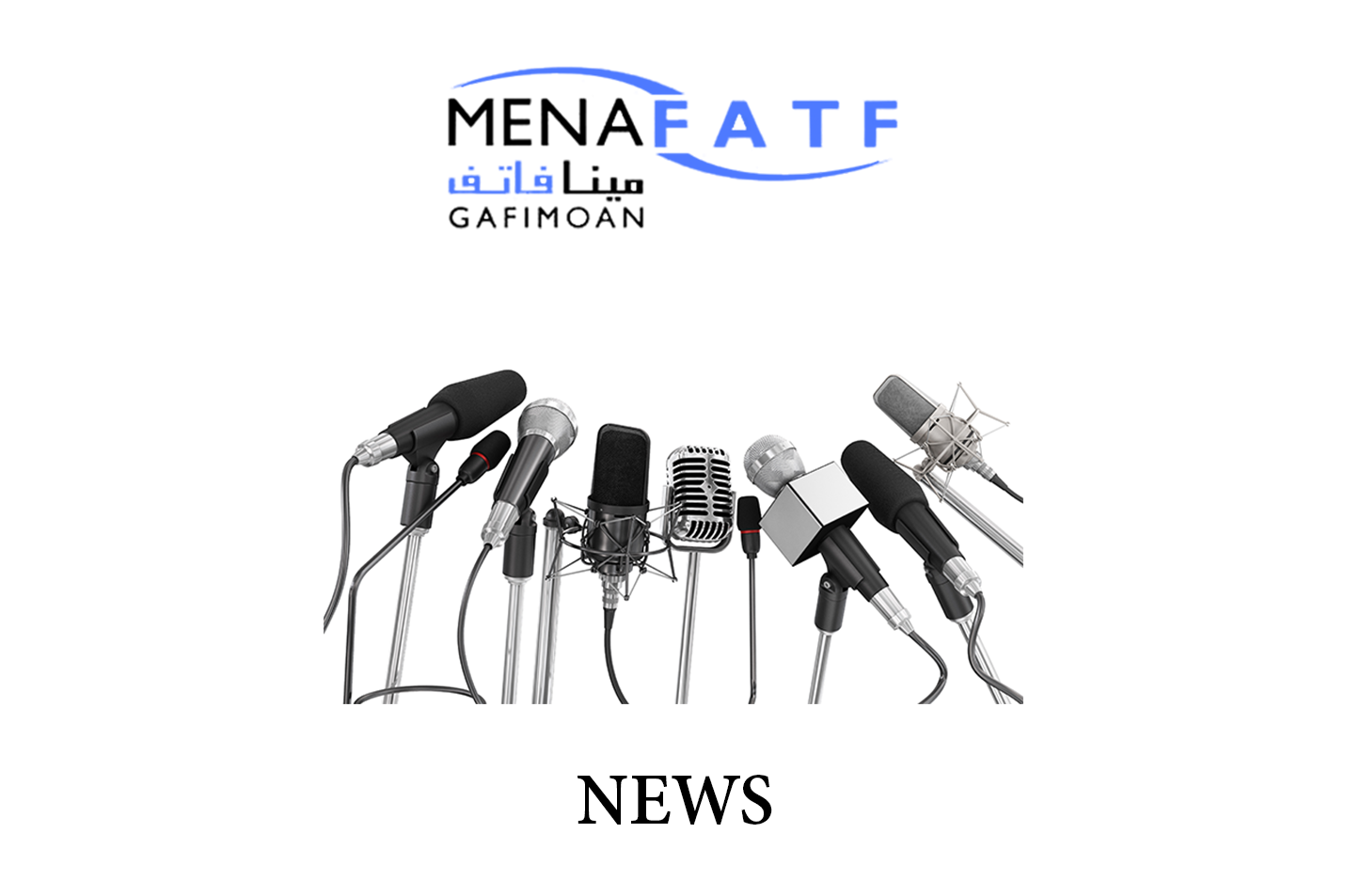The 28th Plenary Meeting of the Middle East and North Africa Financial Action Task Force on Combating Money Laundering and the Financing of Terrorism (MENAFATF) was closed, on Wednesday, 28 November 2018. It was held at the Intercontinental Phoenicia Hotel, Beirut, Lebanon, for two days, starting 27 November 2018, , under the presidency of HE Mr. Abdul Hafiz Mansour, the Secretary General of the Lebanese Special Investigation Commission (SIC), and the secretariat of HE Dr. Alwaleed Bin Khalid Alsheikh, the MENAFATF Executive Secretary.
The Plenary Meeting was attended by AML/CFT experts from twenty-one Arab member countries (the Hashemite Kingdom of Jordan, the United Arab Emirates, the Kingdom of Bahrain, the Republic of Tunisia, the People's Democratic Republic of Algeria, the Republic of Djibouti, the Kingdom of Saudi Arabia, the Republic of Sudan, the Arab Republic of Syria, the Federal Republic of Somalia, the Republic of Iraq, the Sultanate of Oman, the State of Palestine, the State of Qatar, the State of Kuwait, the Republic of Lebanon, the State of Libya, the Arab Republic of Egypt, the Kingdom of Morocco, the Islamic Republic of Mauritania and the Republic of Yemen). The Plenary Meeting was also attended by representatives of several countries and observers at the MENAFATF (the United Kingdom, the United States of America, the Kingdom of Spain, the Federal Republic of Germany, the Republic of France, the International Monetary Fund, the World Bank, the Secretariat General of the Cooperation Council for the Arab States of the Gulf (GCC), the Financial Action Task Force (FATF), the United Nations (UN), and the Egmont Group).
The Plenary Meeting addressed many important topics related to the MENAFATF work and different activities and took several relevant decisions. The most important of which are as follows:
Promoting the MENAFATF efforts in the CFT field
The Plenary Meeting addressed the efforts exerted by the MENAFATF in the CFT field, by following up on the activities of the 5th Operational Forum on Terrorist Financing (OFTF) which was held in the margins of the 28th Plenary Meeting on 24 November 2018 and which also addressed an update of the latest information relating to the risks of terrorism and its financing in the region, as well as the latest developments relating to TF risks, methods and trends through the exploitation of new payment technologies and virtual currency in ML/TF operations, based on the practical experience of the participating experts. The OFTF discussed the MENAFATF future CFT plan for the years 2019-2020 and reviewed the best international practices on the mechanisms and methods of national cooperation and sharing of information to combat the financing of terrorism. The OFTF addressed the latest CFT projects and developments at the FATF.
Relationship with the FATF, the international and regional organizations and counterparts
The Plenary Meeting addressed some topics relating to the relationship of the MENAFATF with the FATF, the international and regional organizations and counterparts, and followed up on the outcomes and developments of the MENAFATF latest typologies projects.
It presented the forms of cooperation with international and regional organizations and counterparts (the International Monetary Fund (IMF), the Egmont Group, the United Nations Office on Drugs and Crimes (UNODC), the Arab Monetary Fund (AMF), and the Executive Directorate of the UNSC Counter-Terrorism Committee) by holding joint workshops and organizing on-site visits.
The Plenary also presented the latest developments regarding the typologies and capacity building workshop in the AML/CFT field that the MENAFATF is planning to organize in March 2019, in participation with the Eastern and Southern Africa Anti-Money Laundering Group (ESAAMLG), the Task Force on Money Laundering in Central Africa (GABAC), and the Inter-Governmental Action Group against Money Laundering in West Africa (GIABA).
The 2nd round of mutual evaluations of the MENAFATF member countries for their compliance with the international standards on combating money laundering and financing of terrorism and proliferation
In the context of the 2nd round of mutual evaluations of member countries for their compliance with the (revised) international standards on combating money laundering and financing terrorism, according to the new assessment methodology issued by the FATF, the Plenary Meeting adopted the Mutual Evaluation Working Group (MEWG) proposal to make the necessary amendments to the MENAFATF Procedures for the 2nd Round of Mutual Evaluations. On this note, the Plenary adopted the amendment of paragraph (81) of the paper on the Procedures for the 2nd Round of Mutual Evaluations, and mandated the MENAFATF Secretariat to study the proposal to amend the MENAFATF Procedures for the 2nd round and to take the relevant views of the FATF and member countries. Furthermore, the Plenary Meeting discussed the addition of the Republic of Somalia and the Republic of Djibouti to the timeline of the 2nd Round of the Mutual Evaluation and the mandate of the MENAFATF Secretariat to prepare a proposal to add both countries to the timeline of the evaluation process and to present it to the 29th MENAFATF Plenary Meeting. It also discussed the MENAFATF Secretariat experience in the 2nd round of mutual evaluations, while focusing on the topic of providing and designating experts (assessors and reviewers) having competence and expertise in combating money laundering and terrorist financing, in order to overcome the challenges of the 2nd round of mutual evaluations.
As to the Mutual Evaluation Report for the Kingdom of Morocco, the Plenary Meeting decided to defer the decision regarding the said Report for the 29th MENAFATF Plenary Meeting, according to the MENAFATF Procedures, as an exceptional action and to assign the assessment team to pursue their work with the MENAFATF Secretariat in order to insert the necessary amendments and make the final draft of the report, according to the MENAFATF Procedures, taking into consideration the comments made during the MEWG meeting.
The Plenary Meeting adopted the 3rd Follow-Up Report for the Republic of Tunisia (which includes a request for technical compliance re-ratings) within the 2nd round of the mutual evaluation, noting that the observations raised during the discussions were mirrored in the report. The report shows the progress achieved by Tunisia to enhance its national AML/CFT system and the Plenary Meeting decided that Tunisia shall submit its 4th Follow-Up Report within the enhanced follow-up process to the 30th Plenary Meeting in November 2019.
Follow-ups subsequent to evaluations of member countries for their compliance with the international AML/CFT standards, within the 1st round of evaluations
In the context of follow-ups subsequent to mutual evaluations within the 1st round of the mutual evaluation, the Plenary Meeting reviewed the Follow-Up Reports of some member countries which comprised the progress they achieved in their compliance with the international AML/CFT standards. The Plenary praised the achievements made by the countries in promoting their relevant systems, based on the plans set out in their respective Mutual Evaluation Reports.
On this note, the Plenary Meeting examined the 2nd Update Reports for the UAE and the Arab Republic of Egypt, concerning the latest developments and which comprised the latest actions both countries have taken to enhance their AML/CFT systems. The Plenary Meeting decided to adopt the 2nd Update Report for both countries and that UAE and the Arab Republic of Egypt shall cease the submission of update reports within the 1st round, given that the 2nd round of the mutual evaluation for both countries will start soon.
Typologies reports
Regarding typologies, the Plenary Meeting adopted the Typologies Report on Money Laundering Through the Real Estate Sector which highlights the methods and tools used to launder the proceeds generated from the misuse of real estate regionally. It also provides a number of examples, case studies and a list of suspicion evidences and indicators. This project mainly aimed at detecting and understanding the nature of the real estate activities which are at greatest risk of money laundering and at examining how the real estate sector is being misused in laundering the proceeds of crime. Egypt and KSA have jointly led the Typologies Project on Money Laundering Through the Real Estate Sector, together with a working group formed of experts who represent several MENAFATF member countries, including the Republic of Sudan, the Hashemite Kingdom of Jordan, and the Sultanate of Oman. 9 member countries contributed to this project by answering the questionnaire and providing relevant case studies.
The Plenary Meeting also adopted the MENAFATF/APG joint Typologies project on Terrorist Financing and Social Media, which addressed the main challenges faced by the monitoring, investigation and prosecution authorities in the TF cases resulted by the misuse of social media services and included measures to help competent authorities overcome them. It also highlights the ways and methods of cooperation with social media companies to prevent their misuse in financing terrorism. The Typologies Project on Terrorist Financing and Social Media was executed under the joint leadership of Egypt which represented the MENAFATF, and Malaysia which represented the APG, with the support of the APG and MENAFATF Secretariats. 27 countries participated in the project by answering the questionnaire for the request of information and provision of case studies on terrorist financing through the misuse of social media services.
The Plenary Meeting adopted the MENAFATF revised training plan for the years 2017-2019, provided that the Presidency Priorities for the year 2019 shall be taken into consideration.
MENAFATF meetings held in the margins of the Plenary Meeting
In the margins of the Plenary Meeting, the Operational Forum on Terrorist Financing (OFTF) and the Financial Intelligence Units Forum (FIUF) held their meetings on Saturday, 24 November 2018 and the National Risk Assessment Committee (NRAC) meeting was held on Sunday, 25 November 2018. The MEWG meeting was held on Sunday and Monday, 25-26 November 2018 and the Technical Assistance and Typologies Working Group (TATWG) meeting on Monday 26 November 2018. The Plenary Meeting adopted the working groups and committees’ co-chairs reports and approved upon their recommendations.
Other issues
The Plenary Meeting examined the Priorities of the MENAFATF Presidency for 2019, which concentrated on several main pillars which should be brought into focus during the year. They can be summarized in improving the effectiveness of MENAFATF performance, the establishment of systems, the effective implementation of targeted financial sanctions, the fight against corruption and the laundering of corruption proceeds, asset recovery, in addition to the interest in combating human trafficking and migrant smuggling. The Plenary Meeting adopted the MENAFATF Strategic Plan for the years 2019-2021, together with the Work Plan and the Presidency Priorities for 2019.
The State of Libya will assume the position of President of the MENAFATF for 2019 and the Arab Republic of Egypt will assume the position of Vice-President. The next (29th) Plenary Meeting will be held in April 2019, in the Hashemite Kingdom of Jordan.
Finally, the Plenary Meeting concluded with the comments of the observers who praised the MENAFATF efforts to protect the region from risks of ML/TF operations and expressed their willingness to cooperate with the MENAFATF in this regard. The delegations also appreciated the good hospitality and organization.

